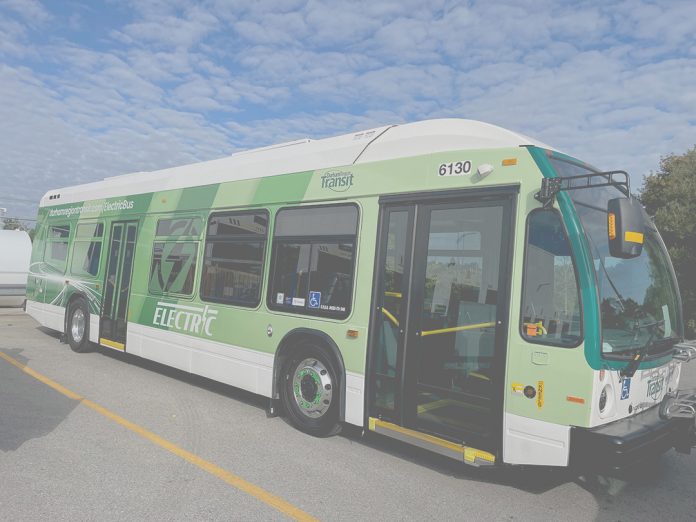In September, Durham Region Transit (DRT) introduced its first six battery-electric buses (BEBs) as part of the E-Mission Zero program.
The BEBs are manufactured by Quebec’s Nova Bus and powered by Oshawa-based EnerFORGE’s charging infrastructure. They boast a range of 225 kilometres per charge and will initially serve high-traffic routes, such as the PULSE lines, which are DRT’s rapid bus routes connecting key areas of the region.
Supported by $12.1 million in funding from the Canada Community-Building Fund, a federal program that provides municipalities with stable funding for local infrastructure projects, this marks a significant step toward DRT’s goal of a fully electrified transit fleet by 2037.
In addition to the Canada Community-Building Fund, Durham Region has secured low-interest financing from the Canada Infrastructure Bank, with up to $62 million available over the next four years. This funding will enable DRT to purchase up to 98 more electric buses, propelling the region toward its goal.
BEBs offer sustainable public transportation and help in reducing carbon emissions.
“We are grateful for the federal government’s partnership in making this project a reality,” said regional councillor Marilyn Crawford, chair of the Transit Executive Committee. “The Canada Community-Building Fund and the Canada Infrastructure Bank’s support are vital in Durham Region Transit’s transition to a green transit fleet.”
DRT aims to enhance service efficiency, reduce noise pollution and improve air quality throughout the region. This isn’t Durham’s first move toward greener transportation.
DRT has already introduced ten hybrid buses, which have been in operation for nearly two years.
Pri Uthayakumar, senior manager of infrastructure, safety, and technology, said this has served as a good transition from diesel models to hybrid vehicles, helping the region achieve some of its sustainability goals.
However, according to DRT, these electric buses have offered multiple advantages over diesel and hybrid buses.
Lower greenhouse gas emissions are one of them. BEBs are critical to reducing the carbon footprint of public transportation. According to a 2020 study published in the journal Sustainability, BEBs can reduce emissions by 31 per cent compared to petroleum-fuelled buses.
“These new electric buses are a critical step in our journey towards a zero-emission future,” said John Henry, regional chair and chief executive officer. “By reducing transit vehicle emissions, we are fostering a healthier, more sustainable Durham Region for generations to come.”
Another benefit is reduced noise pollution. BEBs provide quieter rides, improving the experience for commuters and reducing noise pollution in urban areas.
Beyond reducing noise, BEBs also benefit public health and the environment. By lowering diesel emissions, they help reduce the risk of respiratory diseases, contributing to overall improved public health.
According to a report by the Chicago Tribune, transitioning to electric buses offers significant public health benefits, with an estimated reduction of $55,000 per bus per year in diesel emissions due to the low occurrence of respiratory diseases in the city of Chicago.
Lower operating costs also add to the benefits of BEBs, as although BEBs have a higher upfront cost, they offer long-term savings. Maintenance costs are typically 20 to 30 per cent lower than diesel buses due to fewer mechanical parts. Additionally, BEBs save around $36,200 annually in fuel costs per bus, based on 2023 diesel rates, as per DRT.
It is also important to note that many transit agencies worldwide successfully operate full BEB fleets in all weather conditions. The reason is clear: BEBs help reduce greenhouse gas emissions and support the transition to cleaner, more sustainable transportation systems.
To ensure operational success, DRT is now looking into the pilot project, which involves six BEBs and will assess how these buses perform under diverse conditions, ensuring they meet the region’s transportation needs.
“The introduction of these electric buses will not only reduce our carbon footprint but also provide reliable and efficient service to our growing ridership,” said Bill Holmes, DRT’s general manager. “This is just the beginning of our work towards a sustainable transit future.”




